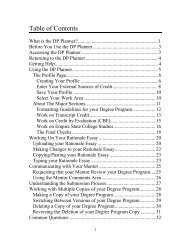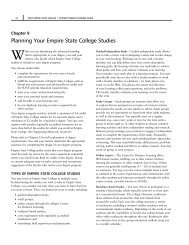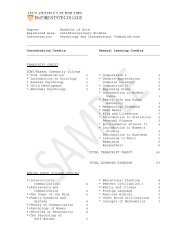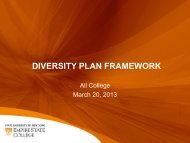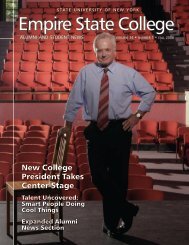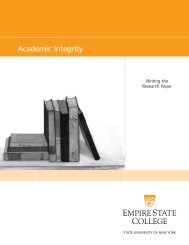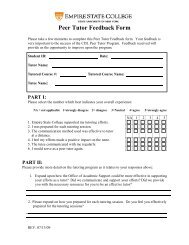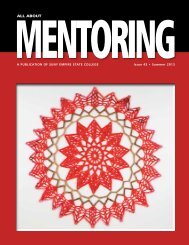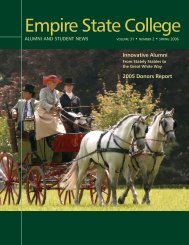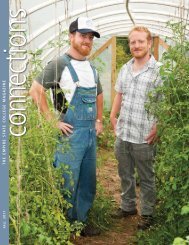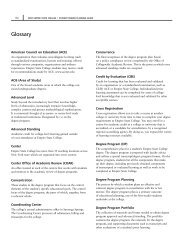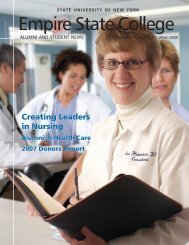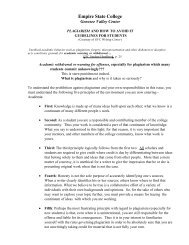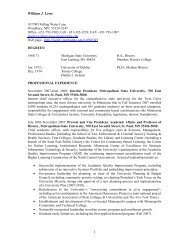Academic Plan 2011-2015 (PDF 524kB) - SUNY Empire State College
Academic Plan 2011-2015 (PDF 524kB) - SUNY Empire State College
Academic Plan 2011-2015 (PDF 524kB) - SUNY Empire State College
You also want an ePaper? Increase the reach of your titles
YUMPU automatically turns print PDFs into web optimized ePapers that Google loves.
6 <strong>SUNY</strong> <strong>Empire</strong> <strong>State</strong> <strong>College</strong>: <strong>Academic</strong> <strong>Plan</strong> <strong>2011</strong> - <strong>2015</strong>Third, the academic plan in general, and in particular the academic themes identified in the firstsection of the plan, are not intended to be static or permanent. As environmental conditions andstudent needs change, so should our academic plan. The Office of <strong>Academic</strong> Affairs will have principalresponsibility for an annual review of the academic plan, in consultation with relevant undergraduateand graduate committees and with faculty and staff throughout the college. By regularly reviewingthe plan, and continually striving to ensure that it reflects the best ideas of all who are affiliated withthe college, we can be confident of its evolving, yet enduring value as a blueprint for serving ourstudents’ needs.Introduction: Student CenterednessIn developing the college’s first academic plan, we sought to identify an organizing principle for ourtask, that is, an underlying concept that could guide the development and direction of an academicplan. The notion of student centeredness emerged to fulfill this need by providing foundationalvalue to the task force’s mandate that was congruent with the college’s mission, history and currentcommitments.Unlike the traditional higher education model which generally requires students to adapt to prestructuredprograms, <strong>SUNY</strong> <strong>Empire</strong> <strong>State</strong> <strong>College</strong> was founded on the premise of engaging thestudent as an active partner in the shaping of his or her own academic program. The focus on theadult learner, by definition, demands consideration of the unique features of the learner’s experienceand, by extension, the manner by which such experience may be integrated in academic goal settingand curriculum design for that student. Processes and practices such as degree planning and learningcontracts are reflective of the student’s central role in mapping the course of his or her education atthe college.Similarly, the college’s historically strong liberal arts curriculum has provided students with exposure toa broad range of human endeavor – for example, in culture and the arts, in business and technology,and in social and natural sciences. A core value of respect – for fellow students and citizens, for theirideas and the communities in which they live and work, and for the environment on which we alldepend – infuses our academic community with a common, fundamental ethic.When taken together, these foundational elements – individualized learning arrangements and liberalarts education – prepare the college’s adult learners not only for professional and vocational pursuits,but also for citizenship in a broader sense. That is, the invitation to students to serve as partners in theireducational planning is characteristic of a paradigm which encourages respect toward others; simplyput, it demonstrates that we care about what they think as well as what they already know. But it alsoestablishes for students a responsibility for active and constructive engagement in the charting andgovernance of their own educational experience.Respect for others and the exercise of social responsibility are essential pillars of good citizenship.Citizenship is a function of participation in the community. Given the distributive and centrifugalnature of our college and the geographical boundlessness afforded by our online model, the definitionof “community” can be quite expansive, a notion that will serve the college well as it moves towardbecoming an “open university.” Moreover, the academic themes proposed in this document suggest acapacity for serving the needs of students who live and work in diverse and far-reaching communities.Ultimately, therefore, citizenship, with respect to our students, may be considered global.



